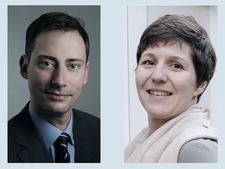-
Topics
subnavigation
Topics
Electromagnetic fields
- What are electromagnetic fields?
- Static and low-frequency fields
- Radiation protection relating to the expansion of the national grid
- High-frequency fields
- Radiation protection in mobile communication
Optical radiation
Ionising radiation
- What is ionising radiation?
- Radioactivity in the environment
- Applications in medicine
- Applications in daily life and in technology
- Effects
- What are the effects of radiation?
- Effects of selected radioactive materials
- Consequences of a radiation accident
- Cancer and leukaemia
- Genetic radiation effects
- Individual radiosensitivity
- Epidemiology of radiation-induced diseases
- Ionising radiation: positive effects?
- Risk estimation and assessment
- Radiation protection
- Nuclear accident management
- Service offers
-
The BfS
subnavigation
The BfS
- About us
- Science and research
- Laws and regulations
- BfS Topics in the Bundestag
- Links
Federal Office for Radiation Protection (BfS) has German Mammography Screening Programme checked
Year of issue 2012
Date 2012.07.03
Date 2012.07.03
The Federal Office for Radiation Protection (BfS) has the German Mammography Screening Programme checked for efficacy to reduce breast cancer mortality within the scope of a research project to be carried out by the University of Muenster from July 2012. Throughout Germany, women aged between 50 and 69 have been eligible for mammography every two years for early detection of breast cancer since 2009.
The programme is aimed at reducing breast cancer fatalities in this age group by nationwide screening. "Within the scope of this long-term research, the University of Muenster is going to scientifically study whether this objective is achieved. The benefits of the Programme must outweigh the potential risks"
, says Wolfgang Weiss, Head of the BfS Department of Radiation Protection and Health. "After all, every examination involves additional radiation exposure. This study will put into action another important item besides the extensive quality assurance measures of the screening programme."
International research has established a benefit of the breast cancer screening programme for women aged between 50 and 69, but there is still question about that. A preliminary risk-benefit-analysis of radiation exposure associated with screening revealed that the benefit clearly outweighs the radiation risk in this age group. It was against this background that the Federal Government introduced the Programme in Germany. "For instance, no screening has been scheduled for younger women because the risk is clearly higher and, more importantly, the potential benefit is lower in this age group. These women therefore should not be subjected to mammography nationwide but only in cases of suspected cancer"
, explains Wolfgang Weiss.
Two-stage project
Whether and to what extent there has been a decrease in breast cancer mortality due to the introduction of mammography screening in Germany has not been proven up to now. This would require an evaluation time of at least ten years. The research project starting now will create fundamental principles for further research into this question.
BfS provides for a two-step project in order to facilitate scientific and efficient implementation of a methodologically sophisticated evaluation. At first, a feasibility study will be performed over the next two years both to find out how the effect of the Programme on breast cancer mortality can be recorded and to develop a concept for implementation. Subsequently, the study will be carried out. Based on the results expected to be available another five years later, an evaluation of the project is scheduled. Thus, preliminary results are to be expected in about seven years.
The research project is funded by the Federal Ministry for the Environment, Nature Conservation and Nuclear Safety, the Federal Ministry of Health and the Mammography Cooperative. Technical co-ordination is done by BfS. The project is accompanied by a steering committee comprising not only the above mentioned ministries and the Cooperative and its supporters but also representatives of the Robert Koch Institute, BfS, the Länder and patient representatives. An independent scientific advisory council advises the steering committee in technical questions.
State of 2012.07.03



